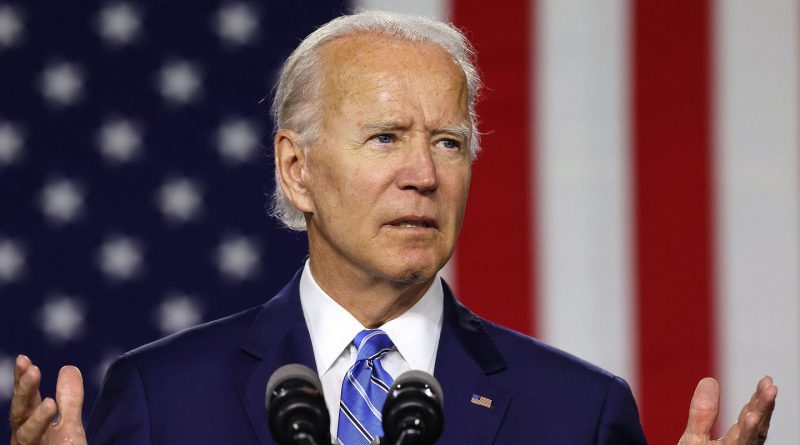OPINION: What will Middle East look like if Joe Biden is elected US president?
If Joe Biden gets elected as US President, a mess will happen in the region.
The November presidential election in the US is approaching. The two main nominees, the current Republican president Donald Trump, and his Democratic rival Joe Biden, are laying out their agendas amid fiery and head-to-head media campaigns to sway voters.
They are on the opposing sides nearly across all the files that concern the US voters, reflecting an extreme version of the partisan division gripping the US political landscape.
Iran wants Biden
Iran is one of the files showing the stark contradiction between the platforms of the two candidates, with Trump hitting the regime hard with sanctions, even beyond the umbrella of the UN Security Council via the snapback mechanism, and with Biden seeking to woo the Iranian regime, and showing tolerance towards the political Islam movements, who have strong links with the Ayatollahs in Tehran.
The nuke deal and the ballistic missiles program, as well as the expansionist policies of the Shiite regime across the Middle East, are main concerns for Trump. He sees that there should be no tolerance with such agenda.
On the other side, Joe Biden, like the former president Barrack Obama for whom Biden acted as Vice President, sees that negotiations and containments are better ways to neutralize the threats posed by the Iranian regime to the US national security interests.
In an Op-Ed on the CNN, Joe Biden argued, speaking of the nuke deal, that “Trump violated an agreement that America itself negotiated and then acted recklessly, other world powers now devote their energies to opposing US policy instead of working alongside us to counter Tehran.”
He added, ”Now, America stands alone. Trump’s policies have pushed Russia and China closer to Iran, while reducing transatlantic relations to their lowest point in decades”, embracing a rhetoric which strikes resemblance to that of the Iranian regime, alleging that Iran managed to isolate the US.
Here, we see that Biden is favoring the nuke deal, rejecting extreme pressure and sanctions and welcoming rapprochement with the clerical regime in Tehran. It is clear now. Biden is on the side of Ayatollahs. And the Ayatollahs want Biden.
Antagonizing Turkey
Unlike Trump, who expressed admiration towards Turkish president Recep Tayyip Erdogan on more than one occasion, Joe Biden has a totally different worldview on the powerful leader. He even wants to support Erdogan’s opponents, deeming him ‘an autocrat’.
In a video featuring comments to New York Times editors, Biden said he is “very concerned” about Erdogan’s approach to Kurds in Turkey, his partial military cooperation with Russia, and access to U.S. airfields in the country, a NATO ally.
“What I think we should be doing is taking a very different approach to him now, making it clear that we support opposition leadership,” Biden said in the video and verified by a transcript published in January by the Times.
“He has to pay a price,” Biden said at the time, adding Washington should embolden Turkish opposition leaders “to be able to take on and defeat Erdogan. Not by a coup, not by a coup, but by the electoral process.” Turkey denounced the comments as interventionist.
On the other side, Trump is totally supportive of Erdogan, showing tolerance towards his agenda in the Middle East, which he vehemently implements in Syria and Libya.
Meeting on the sidelines of the U.N. General Assembly in late September 2017, Trump hailed Erdogan’s leadership in Turkey and said Erdogan “has become a friend of mine.”
“I think now we’re as close as we’ve ever been,” the US president said.
So it is clear now for Turkey: Trump is favorable and poses fewer threats to the Erdoganist agenda.
Biden’s two-state solution
In early May 2020, Joe Biden in a statement to the Jewish Telegraphic Agency, said that as president he would resume US assistance to the Palestinians, reopen the US consulate in East Jerusalem that administers primarily to the Palestinians and would seek to reopen the Palestine Liberation Organization (PLO) mission in Washington.
This shows how far the Biden position on the decades-long Palestinian-Israeli conflict is different and how far he would be favored by both the Israelis and Palestinians.
For Trump, he did many favors to Israel than his predecessor Barrack Obama, whose agenda is similar to that of Biden, despite some marginal foreign policy differences.
The Trump administration moved the U.S. embassy to Jerusalem in 2018, a show of support for Israeli Prime Minister Benjamin Netanyahu that angered the Palestinians and their supporters.
The following year, the administration formally recognized Israeli sovereignty over the Golan Heights, which Israel captured from Syria in 1967, reversing a long-standing U.S. policy and irking other countries.
In August, in a rare victory for U.S diplomacy in the region, Trump brokered a deal between Israel and the United Arab Emirates, which agreed to normalize diplomatic relations. Israel said it would suspend planned annexations of parts of the occupied West Bank. Regardless of the fact that the Biden position supportive of the two-state solution will provide a viable platform for ending the Israeli-Palestinian dispute, it is clear that most of the Palestinian factions and movements favor Biden over Trump.
An article published on Plus 61J Media said, Biden’s platform differs significantly. Perhaps most important is his commitment to “reverse the Trump Administration’s destructive cut off of diplomatic ties with the Palestinian Authority and cancellation of assistance programs that support Israeli-Palestinian security cooperation, economic development, and humanitarian aid for the Palestinian people in the West Bank and Gaza.”
His platform is clear in its rejection of annexation and advocating a return to the two-state solution. Biden commits to “work with the Israeli and Palestinian leadership to support peace-building efforts in the region.”
“Biden will urge Israel’s government and the Palestinian Authority to take steps to keep the prospect of a negotiated two-state outcome alive and avoid actions, such as unilateral annexation of territory and settlement activity, or support for incitement and violence, that undercut prospects for peace between the parties.”
The situation seems drastically different for Trump. He is the best option for the Jews.
American Jews are more likely than American Christians to say that US President Donald Trump is favoring Israel too much in his dealings with Israelis and Palestinians, according to a study by the Pew Research Center published earlier in May 2019 said.
The study said the US Jews are among the most liberal-leaning American minorities, heavily favoring Democratic candidates in elections. They also have very high rates of support for Israel.
Fully 42 percent of American Jews say Trump “favors Israelis too much,” according to the study, which was conducted among US adults between April 1 and 15. A slightly higher 47% say he has struck “the right balance” between Israelis and Palestinians, it added.
The Gulf states
In the Gulf, none will think twice if asked whether he supports Trump or Biden. The Gulf is tired of the Obama administration legacy, especially on Iran. They opposed the nuke deal, saying that the administration did not take into account the interests of the region’s countries when signing the deal with the Iranian regime in 2015.
Since coming into office in January 2017, President Trump’s relationship with the Gulf countries – particularly Saudi Arabia and the UAE – have widely been considered strong by political observers in the US.
Trump’s first foreign trip as President in May 2017 was to Saudi Arabia, marking the first time an American leader picked a Middle Eastern location for their maiden journey. The US withdrew from the deal – which Saudi Arabia called ‘flawed’ – in 2018, a move welcomed by the governments of the UAE, Saudi Arabia and Bahrain.
The Trump administration also helped broker peace deals between the UAE and Bahrain and Israel, opening up horizons of cooperation between the Israeli government and the current governments in the Gulf. Hence, the Gulf seems to be unhappy with Biden, Obama’s vice president and colleague. And it will not abandon Trump at any rate.
Totally different equation
Looking at the foregoing, I argue that the entire region will be thrown into countless complexities. Biden wants a totally different equation, leveraging Iran and the Palestinian factions, including Hamas.
He also displays tolerance towards opposition in Egypt and Turkey, despite the fact that Egypt’s opposition, led by the fugitives of Muslim Brotherhood group, are ideologically harmonious with the ruling AK Party in Turkey, which Biden antagonizes.
If Joe Biden gets elected as US President, a mess will happen in the region. The change will be uncontrollable. The prices that should be paid by the regimes Biden deems foes will turn the region upside down.
The clerical regime in Iran will be further emboldened and given the kiss of life. The animosity towards Turkey and the Gulf, standing on the opposing sides over the position towards the Muslim Brotherhood and political Islam role in the region’s governance and decision-making, will bring the arch-foes together, opening the floodgate for further turmoil and uncertainty in the already restive region.
Wholeheartedly, I can spell it out: The Middle East wants Trump, and the Middle East wants Trump.
Mostapha Hassan Abdelwahab is the former editorial manager of the English edition of the Baghdad Post and former account manager of UAE Forsan English. He is focusing on Iraqi and Iranian affairs, with articles posted on the Herald Report, Vocal Europe and other platforms.



